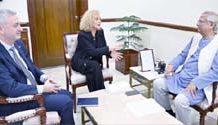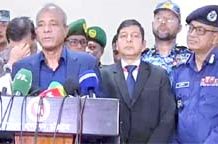C T Online Desk: Let’s start with the conspiracy theories.
Earlier this week on April 5, former Wall Street investment banker Mir Mohammed Alikhan tweeted: “Unbelievable. Two countries refrained from voting against Russian invasion in [the] UN. Sri Lanka & Pakistan. And [l]adies [and] [g]entlemen: Sri Lanka government loses 41 parliamentarians today. Horse trading. Exactly [the] same as Pakistan. Need more proof of American meddling?”
Alikhan is an eccentric and controversial figure, who is accused of embezzling from his own clients (including the Gambino organized crime family) and has remained a fugitive from American justice since 1999. Nonetheless, his claim was re-tweeted thousands of times, because millions of people believe the identical thing.
As you might expect, the establishment view from the West is completely different — if no less wrong — as epitomized by the stentorian, “The Guardian view on strongmen and straw men: [S]outh Asian crises over Russia’s war” that was published on the very same day as Alikhan’s tweet.
The Guardian leadership editorialized loftily that “flying from Islamabad to Colombo gives a bird’s-eye view of the fallout from war over the subcontinent. The three nations under the route are all governed by nationalists who won office by trading in populism. Having gained power, such politicians tend to have a messianic faith in their capacity to effect sweeping change. This belief is being tested, perhaps to destruction, in [S]outh Asian democracies with a combined population of 1.6 billion people.”
What war they are talking about is unclear, but, on the other hand, the newspaper editors are perfectly certain that Imran Khan created his own problems, as has Gotabaya Rajapaksa, whose “quixotic economic policies came unstuck when the war in Ukraine sent energy and commodity prices soaring.” Even more revealing is their take on India under Narendra Modi, who is described as “South Asia’s biggest strongman.”
Here the editors are both scathing and selectively dishonest: “Like Jair Bolsonaro in Brazil and Mohammed bin Salman in Saudi Arabia, Mr Modi has remained neutral on the war — refusing to condemn Vladimir Putin and sidestepping US-led sanctions.” They say “Delhi is caught in a bind” because its trade with China has been soaring, while Russia supplies roughly half India’s arms imports: “This dependence might explain why, when Indian students in Ukraine were being killed by Russian bombs, Mr Modi’s ministers blamed them for being in harm’s way.”
There is the rather shifty insinuation that India’s careful, principled tightrope-walking under Modi “would be welcome if his nation’s economic performance had been helped by his policymaking. But his penchant for dramatic gestures has stymied India’s rise.”
And this highly dubious conclusion: “Russia’s invasion of Ukraine could shape the contours of a coming wider global struggle between autocracy and democracy. History might side with that perspective — but it seems a straw man argument in a region where the slide into rightwing, nationalist populism should be, right now, a bigger concern.”
Leave aside the monumental irony that this UK publication is bloviating so shamelessly in the era of Boris Johnson, in the same week Viktor Orban’s neo-fascist Fidesz won another landslide victory in Hungary, and Serbia re-elected its equally hard-right president Aleksandr Vucic, while the xenophobic extremist Marine Le Pen is gaining fast in the French presidential election to be held this weekend.
The much more important point is that the people of South Asia are not rolling over nearly as easily as all those hapless Europeans.
As the perceptive young author and international affairs analyst Mohammed Zeeshan put it in his own widely circulated tweet on April 6: “In a bizarre way, Sri Lanka has actually emerged as South Asia’s most advanced democracy this week. In the face of widespread protests over a collapsing economy, cabinet ministers quit and the strongman president has revoked emergency restrictions.”
Zeeshan said this was “unthinkable in other countries” and explained in a follow-up tweet: “Rajapaksa was elected on the back of Buddhist-Sinhalese majoritarianism. But in the face of incompetence, neither Buddhism nor Sinhalese is helping him politically.”
When I wrote to him to ask for elaboration, Zeeshan responded: “What is striking about this ongoing crisis in Sri Lanka is the way in which Sri Lankan civil society has banded together. When the protests first began in Colombo, President Rajapaksa tried to crack down and imposed emergency powers. But those had to be revoked soon enough, after several of his cabinet colleagues resigned. In some sense, it looks like ethnic nationalism — which is essentially a “divide and rule” tactic — has fallen apart in the face of this economic crisis, which has impacted everybody.”
He pointed out that in Pakistan, “Imran Khan has presided over more economic mismanagement, which has resulted in spiraling inflation and fiscal deficit woes. But if you look at his ability to mobilize crowds even right now in Islamabad, it’s simply extraordinary that he enjoys such a cult-like following. His decision to call early polls also seems to suggest that he is extremely confident of winning, whether or not the military backs him.”
There is an obvious conclusion: “I think Sri Lanka shows that an economic crisis spares no one and that there’s a limit to ethnic nationalist populism. Unless populists are able to back up their politics with sensible economic governance, they’re likely to hit their limits at some point, and all too often, populists are unable to deliver. Their politics is, in essence, meant to be a distraction from economic strife. In some countries, that has worked better than in other countries such as Sri Lanka. But ultimately, a government has to benefit everybody and not just one segment of the population.”













